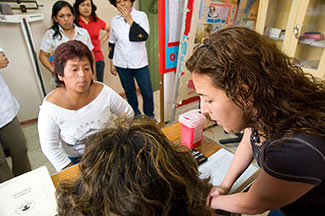
Conference seeks to advance women in global health
January / February 2019 | Volume 18, Number 1

Photo by David Snyder for Fogarty/NIH
Participants at the recent Women Leaders in Global Health
conference explored barriers to progress, such as those
experienced in Peru by Fogarty grantee and former health
minister, Dr. Patty Garcia (right).
conference explored barriers to progress, such as those
experienced in Peru by Fogarty grantee and former health
minister, Dr. Patty Garcia (right).
By Karin Zeitvogel
A woman health worker in rural India was gang-raped “to teach her a lesson” after she promoted contraception, family planning and education for girls. Women working on polio vaccination campaigns have been abducted and killed. And one of the world’s few women health ministers was asked during congressional testimony if she was married or single. The male lawmaker asking the question said the answer would indicate to him and his colleagues if the minister had ever had “a good night.”
Those were some of the stories heard by the 900, mainly female attendees at the second Women Leaders in Global Health (WLGH) conference , held in London in November. Despite women making up around three-quarters of the global health workforce, often serving on the frontlines of a health crisis or providing unpaid care for a family member, they hold less than a quarter of global health leadership positions, noted former Fogarty trainee Dr. Soumya Swaminathan, who is now WHO Deputy Director-General for Programmes.
Change has to start at the base of the pyramid and cover every level of caregiver and recipient, conference-goers were told. “We need leaders and excellent foot soldiers,” said Dr. Wafaa el-Sadr, a professor at Columbia University and member of Fogarty’s advisory board. “Everyone within an organization needs to be transformed.” All women need access to quality health care, and organizations need to revisit their messaging about women’s health, said Dr. Joanne Liu, the international president of Médecins Sans Frontières (MSF). “If we don’t improve access to health care for women, we’re always going to be running behind a train that is moving faster,” Liu said. Three-quarters of patients who go to MSF hospitals are women seeking care for a pregnancy-related issue or to give birth, she added. “But we never talk about that. We talk about the war-wounded, about Ebola, never about women coming in to deliver and being safe and well cared for.”
All leaders, male and female, need to be able to inspire others “to pursue a common mission that’s higher than yourself and the people you’re trying to lead,” said the Bill & Melinda Gates Foundation’s Dr. Anita Zaidi, who is also the principal investigator on a Fogarty-supported project on children’s health. Women in leadership positions can have a broad impact, said former Fogarty trainee, Dr. Patty Garcia, who was health minister of Peru from 2016-17. During her 15 months in office, Garcia successfully pushed to allow contraception from the age of 14 to tackle Peru’s teen pregnancy problem, and changed the way Peru screens for cervical cancer. “We now have molecular testing and self-testing so women can be empowered taking their own samples,” Garcia told the conference. But change didn’t come without a struggle. “I got into a big fight with male physicians - they didn’t want empowerment,” said Garcia - the woman health minister who was asked about her marital status.
Women leaders need to be assertive to overcome resistance to being included in top-level conversations, said Dr. Ayoade Olatunbosun-Alakija, Nigeria’s chief humanitarian coordinator. “There’s an urgency - we don’t have time to wait around and be invited,” she said. “If they don’t give you a seat at the table, pull up a folding chair. If they don’t let you pull up your folding chair, sit on the table.”
The conference, part of the Women Leaders in Global Health Initiative , was hosted by the London School of Hygiene and Tropical Medicine. The 2019 WLGH conference is set to take place in November in Rwanda.
More Information
- Women Leaders in Global Health (WLGH) conference
- Women Leaders in Global Health Initiative
- NIH trying to change science culture, boost women’s role
Sep / Oct 2018 Global Health Matters - Opinion: How can we encourage female leaders in global health? by Fogarty Director Dr. Roger I. Glass
Jul / Aug 2017 Global Health Matters
To view Adobe PDF files, download current, free accessible plug-ins from Adobe's website .





















.png)









No hay comentarios:
Publicar un comentario